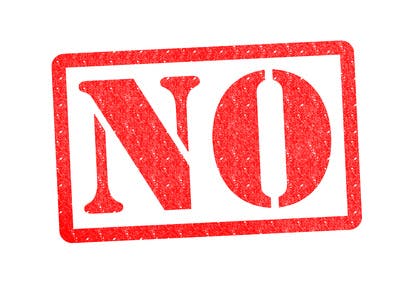The Importance of Saying NO
MC
Freelance ProgrammingWeb Development
Having a can-do attitude is generally a good thing. However, learning to respectfully decline requests or projects is vital for your career in the long run. This is especially true for freelancers, but relevant for everyone.
More productive is always better, naturally. But realistically, no one person can do everything. Taking on too much can break an individual, a team, or a whole company. It can also make you settle for the wrong kind of work and waste time and energy.
When you’re new to development, it’s easy to fall into the trap of taking the first project that comes along, or doing whatever is asked of you. Sometimes you have to; if you have no experience, you’ve got to do something to get some experience.
Be very careful not to make this into a reflex that you do without thinking.
The dangers of saying ‘yes’ too much
When you say yes to every project that comes along, you’re bound to fall into one of these traps eventually:
- Burning out from working too much
- Getting paid too little
- Working on something that doesn’t help your career in any way
- Being abused/taken advantage of (not physically…but hey, you never know.)
- Making big commitments too soon (it’s good to date around a bit).
- Disliking what you do – for the wrong reasons.
Furthermore there are some clients or bosses who will keep asking for things until you do say no. Some are abusive, sure – but some are just not entirely attuned to your limits. They might presume that if you’re saying yes to everything that you can handle whatever they throw at you. Which is a good thing, unless they’re really giving you too much – in which case you’ve gotta draw the line somewhere.
Everyone’s a little different
You may be thinking, “I can do all of this!” If you’re on a hot streak, taking everything that comes your way with success, good for you – enjoy the rush. But i ask you, what percentage of those projects are actually things you can show off? At some point, “taking on everything” means some stuff will be less marketable than others.
Similar to “measure twice, cut once” or the Pareto Principle (aka, the 80/20 rule) – the more choosy you are, the more good things will come from your efforts (whether you’re taking on a little or a lot).
How to choose projects
I use a simple decision making process to pick which projects I take on. I didn’t invent this, lots of people use something similar. Here’s my version of it though. \
When any project or job comes along, it should satisfy at least 2 of these criteria (preferably 3-4):
- You’ll learn valuable knowledge.
- You’ll have something valuable to show on your portfolio/resume/brag about.
- You’ll get paid a good amount.
- You’ll meet some valuable contacts.
That way, even in the less-than-perfect projects, you’re still benefitting a good amount.
Initial Sacrifices: Sucking It Up
If you’ve got no experience, you may have to take one or two projects that suck to build up your resume. Make sure they’re short commitments.
And get at least one of the things above: namely, either valuable knowledge or something to show off. These two are the things that will give you better credibility, hence helping you build the power to be more picky.
Story Time: My Career Shift
TL;DR: read “The Bottom Line” below.
At one point in my career I was in the “yes” mode – as soon as one project was ending, I’d take the next one that came along without being too choosy. It didn’t even matter whether it was an HTML/CSS project, PHP, Cold Fusion (shoot me), or some other madness. It didn’t matter who it was for. I don’t think I was that picky about the pay either.
This lack of specialization left me as a jack of all trades who was making a lot less than he could. I decided to focus on front-end for a while. Specifically, I got good at taking PSD designs and making them look pixel-perfect in all browsers (including Internet Explorer 6, which was a royal pain at the time).
I went to tech recruiters at that point. The recruiters started getting me work. And as I got more work, I started getting pickier. I said no to anything that wasn’t front-end. I jumped on anything with a big name attached, and I put it on my resume immediately after the project. I turned down anything that wasn’t either a recognizable name or didn’t fit a couple of my criteria above.
Soon I had a resume full of names like Fedex, Frito-Lay, Hampton Hotels. I put them on my personal website at some point. Eventually I was getting job offers from recruiters, random clients who came across my website, and other people I had worked with or met in the past. Since recruiters take a cut of your hourly pay, I found out I could make a lot more by getting the work directly. So eventually I didn’t need to go through recruiters at all.
The Bottom Line
In short: try to know your worth, so you can be picky. Specialize in something that is both in-demand, and others aren’t great at. Say no to things that suck. If you’re new to the game, make sacrifices (by taking not-so-great projects) if you have to, but GET SOMETHING for it – something you can show off.
